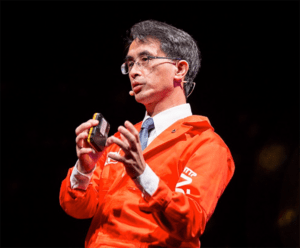
Michigan alumnus Wu set to lead Taiwan’s space R&D efforts
His top priority is to design and manufacture Taiwan’s own satellites and rockets.

His top priority is to design and manufacture Taiwan’s own satellites and rockets.
Michigan aerospace engineering alumnus Jong-Shinn Wu (PhD 1994) was named the new director-general of Taiwan’s National Space Organization (NSPO)—a leading government agency comparable to NASA in the United States. When he takes charge on August 1, Wu will lead his country’s space R&D efforts as the nation makes a concerted effort to fully participate in the world’s space economy.
According to Wu, new legislation in Taiwan encourages the development of technologies to enhance the competitiveness of space-related academic and industry research.
“Taiwan has the opportunity to be one of the important [players] in the space industry,” said Wu, a distinguished professor of mechanical engineering at National Yang Ming Chiao Tung University who will take a leave of absence from academia while at NSPO. “For example, we can leverage our very strong semiconductor IC capabilities through the robust supply chain including numerous design houses and foundries, especially TSMC.”

Wu’s ambitious plans for NSPO include designing and manufacturing its own satellites and rockets. Up until now, Taiwan has launched several satellites such as CubeSats and Small satellites, named Formosa I through VII, aboard other countries’ space vehicles such as SpaceX rockets in the United States.
He also aims to double NSPO’s workforce to 600 employees by 2028, while growing its annual $100 million (U.S. dollars) budget.
“I’ll be a decision-maker, following the top priorities of our government,” Wu said. “It’s a complicated job and quite different from pure research.”
A Fellow of the American Society of Mechanical Engineers and an Associate Fellow of the American Institute of Aeronautics and Astronautics, Wu is a leading expert in plasma physics, hybrid rocket propulsion, and parallel scientific computing research. Until recently, he served as director of the Advanced Rocket Research Center, where he managed a team of more than 40 research engineers and graduate students.
He also has valuable industry experience, having founded Taiwan Innovative Space (TiSPACE), a private company in Taiwan that specializes in space technologies and launch services.
Wu has fond memories of his time with the Department of Aerospace Engineering, where he completed his PhD under the direction of the late Professor Gerard Faeth, a National Academy of Engineering member known for his expertise on combustion.
“What I learned most from him was how he organized the group of people working with him, and how he inspired us to pursue what seemed to be impossible,” said Wu, recalling the weekly morning meetings with his advisor and other members of his research group. “He taught me how to organize very complicated physics [problems] with some simplified principles.”